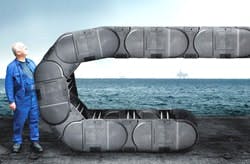The faster and more frequent the movement, the more important exact positioning of the cables becomes. But previously only steel cable carriers could be used to guide and protect cables in extremely demanding environments.
SEE ALSO: Flexibility Pulls Cables to New Areas
Igus says the maintenance-free design of its new Energy Chain E4.350 plastic cable carrier, which will be available in 2009, addresses many of the inherent shortfalls that come with steel. "No other plastic cable carrier has ever been manufactured to this size before," says Joe Ciringione, national e-chain sales manager at Igus. "Until now, only metal cable carriers existed in this size and could withstand such high loads.
Additionally, steel cable carriers of this size are usually custom-made, whereas the Igus E4.350 will ultimately be available directly from stock."
Igus' largest-ever plastic cable carrier's design and modular components are geared toward rapid assembly times for the customer and will be available in completely pre-harnessed systems, if required, to further save time. "The company's focus is to develop cable carriers in line with advancing automation technology capable of achieving higher loads, faster speeds and longer distances," says Ciringione. "The E4.350 can take loads in the region of 70 lb/ft. Generally speaking, Igus cable carriers are able to travel distances over 1,400 ft. and reach speeds faster than 1,000 ft./min., depending on the fill weight and rate of acceleration involved."
The plastic cable carriers were created to move nearly 50 ft. up and down, which helps to protect and guide heavy hydraulic cables when a drilling rig is skidded on to an oil platform or during the drilling head's stroke, for example. The giant cable carrier has an internal height of approximately 14 in. and a variable inner width of 8 in. to more than 3 ft. Large cables and hoses with diameters up to around 12 in. can be guided by the plastic chain.
The company says E4.350 is designed to ensure extremely high torsional rigidity and stability. Interlocking links and the large bolted joint between them were used to make the movement smooth. It also is designed to increase lateral stability significantly and prevent the cable carrier from coming apart. Integrated sliding surfaces, larger wear surfaces and extra-strong stop-dogs are included to lengthen the service life. Center links increase stability further and make it possible to extend the width of the cable carrier almost without limitation.
Triboplastics are the basis of all Igus products and systems. "Tribological interactions occur whenever one material slides over another," explains Ciringione. "This wear can result in loss of material from one or both of the interfacing surfaces. Wear is typically minimized by using a layer of lubricant to reduce surface contact. In contrast, Igus plastics inherently contain solid lubricant as microscopic particles released in tiny amounts during movement. All Igus products are, as a result, completely lubrication-free, greatly reducing the need for maintenance. We're continually developing new polymer blends for every application scenario, all of which are developed for longer life at lower cost. More recent tribological developments mean that we now also offer special materials optimized for use in electrostatic discharge (ESD) and high-temperature environments."
About the Author
Mike Bacidore
Editor in Chief
Mike Bacidore is chief editor of Control Design and has been an integral part of the Endeavor Business Media editorial team since 2007. Previously, he was editorial director at Hughes Communications and a portfolio manager of the human resources and labor law areas at Wolters Kluwer. Bacidore holds a BA from the University of Illinois and an MBA from Lake Forest Graduate School of Management. He is an award-winning columnist, earning multiple regional and national awards from the American Society of Business Publication Editors. He may be reached at [email protected]

Leaders relevant to this article:

